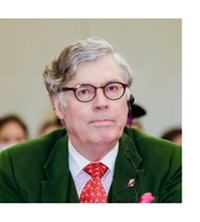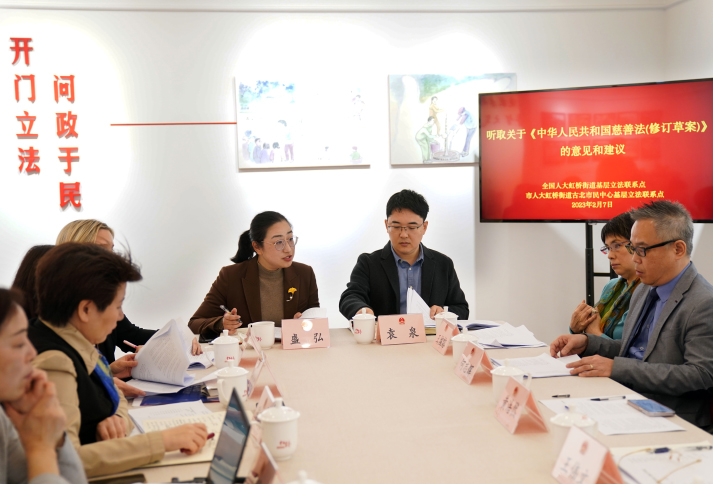| Voice |
| Chinese Modernization, a gift to the world | |
|
|
|
|
|
 Executive Chairman of the America-China Partnership Foundation John Milligan-Whyte is referred to as the "new Edgar Snow" due to his efforts in promoting the relationship between China and the United States. "China's success speaks for itself," Whyte said in an exclusive interview with Beijing Review reporter Tao Zihui. Edited excerpts from their conversation follow: Executive Chairman of the America-China Partnership Foundation John Milligan-Whyte is referred to as the "new Edgar Snow" due to his efforts in promoting the relationship between China and the United States. "China's success speaks for itself," Whyte said in an exclusive interview with Beijing Review reporter Tao Zihui. Edited excerpts from their conversation follow:Beijing Review: In terms of planning, organization, leadership and the ability to achieve set goals, what specific advantages would you think China's political system holds in boosting the country's development? John Milligan-Whyte: What China has done is that it has created socialism with Chinese characteristics and that has produced more economic development and social progress than in its history. China has created a unique form of government, which corrects the deficiencies of a lot of other systems of democratic and nondemocratic governments. It is called socialism with Chinese characteristics, people-centered government or whole-process people's democracy. Any society has to have a representative government. If you have 1.4 billion people, or as in America, 330 million people, you have to have representatives of those people to govern. The big problem, in any country, is how you pick the representatives and how you make them responsible to the people generally. Abraham Lincoln once summarized that ideal as "government of the people, for the people and by the people." The problem is that government "for the people" is something other countries, like the United States, have not achieved, but China has. A book written 2,300 years ago, Plato's Republic, is the key to understanding China in 2023. The ancient Greek philosopher talked about an ideal human society in which a group of guardians were chosen based on their character and abilities, to rule a society. To me, the Communist Party of China is like China's guardian party. It created the People's Republic of China and has guided it in this tremendous economic development and poverty alleviation. Out of 1.4 billion people, China has generated what Plato would call a philosopher statesman. What's the difference between a professional politician and a philosopher statesman? The difference is that philosopher statesmen have an entire system of thought, which now in China is called Xi Jinping Thought on Socialism with Chinese Characteristics for a New Era, which sets a mindset; a mindset not only for those within the Party, but also for those within the National People's Congress and the Chinese People's Political Consultative Conference National Committee [the country's top political advisory body], and among the 1.4 billion people. In this case, there is a philosopher statesman leader who envisions not only common prosperity for all Chinese—and that's socialism—but also who envisions a shared future, a shared constructive future for humankind. And this is what China's modernization has presented: a new way to modernize, what I call socialist modernization, as opposed to capitalist modernization. That is a gift. Simply proving that socialism works in creating economic and social progress gives 200 nations around the world a different choice. China is unique in providing that leadership for the world. China has shown it's capable of successful, long-term economic planning; other countries, those having multiple competing elections all the time, cannot conduct effective long-term social or economic planning.  Sheng Hong (fourth right), a deputy to the National People’s Congress, seeks residents’ feedback on a draft amendment to the Charity Law at a community center in Hongqiao Subdistrict of Shanghai on February 7 (XINHUA)
Beijing Review: What's the difference between U.S. democracy, or Western democracy, and Chinese democracy? John Milligan-Whyte: Let's start with American democracy. There was a Princeton study two years ago in which they found that America basically was designed in its Constitution to be a plutocracy ruled by rich people and gradually, over the centuries, the vote was expanded to more and more people. But as a study of Harvard demonstrated, although you have votes, 1 percent of the population control who gets elected. Because the cost of funding elections is so high, America has professional politicians. In contrast, China has a 1,000-year history of picking government administrators based on merit. Although America has professional politicians who can achieve a consensus to implement the promises they're making, China has what I call professional government administrators chosen by merit. That's one of the big differences. The other thing is the whole idea of socialism in the West. It was thought socialism could never modernize a country economically but China has demonstrated it really works. And one of the things I admire about the country is what is called people-centered democracy, which has basically combined the idealism of socialism, that you should benefit everybody, with the idealism of democracy, which is that a government should serve the people's interests, and with the long historical tradition in China. These things combined meet the shared desire among all 1.4 billion Chinese for economic and social development. In Western societies, capitalism controls politics and public policy; in China, socialism controls politics and public policy. That is the only way you achieve that type of economic growth and there is no country that has been able to achieve that level of poverty alleviation and economic growth. That's why I really admire the Chinese system of government. Beijing Review: In one of your previous articles, you mentioned that you feel the most important change in the country is how the Chinese have become more confident in recent years. How do you understand this confidence? John Milligan-Whyte: An outfit in Denmark recently took a survey and they found that the people of China had the most trust in their government of any country in the world. And that is because they have seen the success of the Chinese guardian party in creating all this economic and social progress. So Chinese people are justifiably confident in what China has achieved and what its prospects are in the future. China's gone from a little string-bean 10-year-old to a gorgeous economy, a gorgeous society. The West is shocked that there is a new way to modernize and that China is soon going to be the largest economy in the world. I think it will take two or three generations for the Americans to get over becoming the second largest economy, realize that another system of government, socialism, produces more wealth and more social progress, and that we're not perfect. Copyedited by G.P. Wilson Comments to taozihui@cicgamericas.com |
|
||||||||||||||||||||||||||||
|